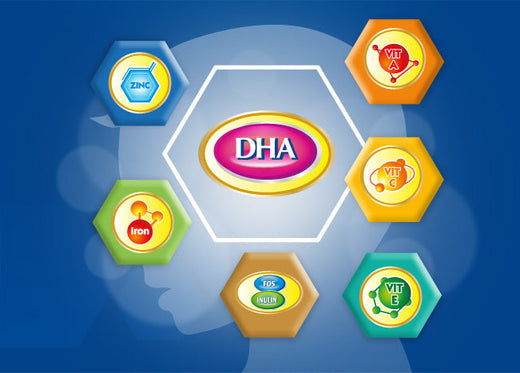
Every child develops at their own pace, achieving developmental milestones when they are ready. However, that doesn’t mean you don’t have a role to play. Parents can support their child’s growth and development in many ways. Well-rounded brain development is based on two key foundations: nutrition and stimulation. Find out how to utilize both to help your child reach their developmental milestones.
Nutrition to Support Developmental Milestones
During this period, your child’s brain continues to develop rapidly. In order to help him reach his full potential, you will need to incorporate the right nutrients into your child’s diet, as good nutrition lays the groundwork for well-rounded development.
It begins with identifying key nutrients for your child. Supporting brain development, providing nutrition for growth, and building immunity are all possible.

|
DHA is found abundantly in the brain, making it a crucial nutrient for your child’s brain development. |
|||
 |
Zinc is essential for growth. It aids cell division and immune function1. |
 |
Vitamin E is an antioxidant, and it also boosts the immune system by helping to fight bacteria and viruses3. |
 |
This mineral plays an important role in red blood cell formation. |
 |
This vitamin has many important functions. Aside from strengthening immunity, it also contributes to the absorption of iron from non-meat products. |
 |
Galacto-oligosaccharides (GOS) are prebiotics that stimulate the growth of intestinal Bifidobacteria. They are a great source of dietary fibre2. |
 |
Vitamin A aids in maintaining the health of the skin and mucous membranes and helps the functioning of the eyes. |
The Role of Stimulation in Child Development
Stimulation works together with proper nutrition for your child’s overall development. In general, it refers to a child’s active interaction with not only their parents but also with their environment. Stimulation helps to strengthen connections within a child’s brain.
The goal is to provide 360° development for your child. This means helping your child learn in every aspect of their being. The four aspects of development are:
 |
Cognitive Skills - This involves thought processing. They are the core skills your child’s brain uses to think, remember, identify, and reason. |
 |
Motor Skills - These skills are used for body coordination and movement. |
 |
Communication Skills - Language and interaction are at the core of these skills. |
 |
Emotional Skills - Your child will be able to recognise and control their emotions and behaviours when they develop these skills. |
Stimulation can help the 360° development of your child’s exceptional learning. And by understanding the developmental milestones that signal growth, you will be able to measure and track your child’s progress.
How to Encourage Your Child’s Developmental Milestones

|
1 Year
|
|
|
2 Years
|
|
|
3 Years
|
 |
4 - 5 Years
|
Want to be sure you don’t miss out on any of your child’s milestones? Join the Enfamama A+ Club today where you’ll be able to access exclusive information on activities that can help boost your child’s development. That’s not all - you can also get your hands on free samples, exclusive vouchers and so much more!
Expert Resource:
Dr. Raymond Choy Wai Mun
(MCR 18097A)
MBChB (UK), Aviation Medicine (Singapore)
REFERENCES:
- Zinc in diet, https://medlineplus.gov/ency/article/002416.htm#:~:text=Function&text=Z…., Accessed 16 November 2020
- Inulin and Oligofructose: What Are They?, https://academic.oup.com/jn/article/129/7/1402S/4722577, Accessed 16 November 2020
- Vitamin E, https://ods.od.nih.gov/factsheets/VitaminE-Consumer/, Accessed 16 November 2020





